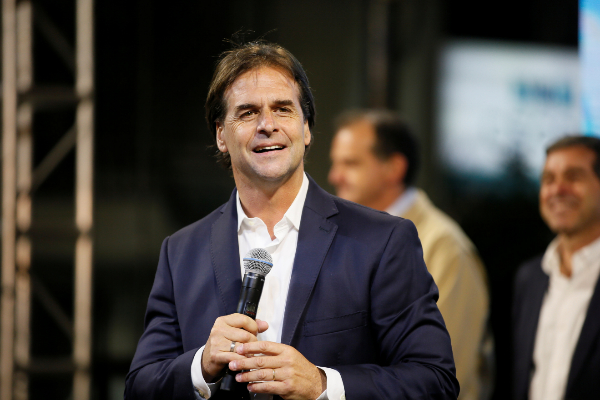- Final count: Uruguay confirms conservative Lacalle Pou as its new president
- Latin America.The center right caresses power in Uruguay
- Elections: Lacalle Pou or the patience of the surfer until confirming that he is the president of Uruguay
Less than five years ago I was sunk on the sofa in his house wondering if it made sense to stay in politics. He came from being defeated by 13 points against Tabaré Vázquez in the second round of 2014, and the blow had reached his soul. It was his wife, Lorena Ponce de León, who made him react: "'Andá' to make the bag and 'start' to travel the country, that is what you like most." And that is largely why Luis Lacalle Pou is today, at age 46, the elected president of Uruguay, a successful "rebel heir" of a key political dynasty in the country's history.
The road to the Executive Tower, the seat of the Government in Montevideo, was not easy, and not precisely because there were objective difficulties: the boy was a predestined, clearly indicated to continue a saga. Having everything in favor, even if it sounds paradoxical, makes things sometimes more difficult, and not only because of the tortuous vote count. The figure of his father, of not exactly simple character, was a clear absence in the campaign of the new president, who was a senator and came to preside over the House of Representatives.
Great-grandson of Luis Alberto de Herrera, who joined the head of the collegiate state a century ago and gave name to one of the great political movements in the country's history, the 'herrerismo', son of Luis Alberto Lacalle Herrera, head of state between 1990 and 1995, and Julia Pou, who was a senator.
Everyone knows that in the life of Lacalle Pou there were never deprivations or economic disturbances, although he rejects that making him insensitive to the needs of the weakest. "It's like saying that to be a good oncologist you have to have cancer," he once illustrated. He studied at the British College and became a lawyer at the Catholic University, but never wanted to practice. "I am a frustrated marine biologist," he says, and that is what his great passion is, surfing, which surpasses that of football, in which he is declared a fan of Nacional, one of the two great teams in the country next to Peñarol.
Surfing, a sport in which patience is essential, must have served to calm the anxiety between the elections last Sunday and the announcement today, when the Electoral Court has confirmed that its advantage over Daniel Martínez, the candidate of the leftist Frente Amplio, was as narrow (1.3 percent) as unquestionable.
Thus, the historic National Party (or White, as it is also known) returns to power and evicts the left after 15 years in the Government. A whole generational change: the four main rivals of the new president in the first round were sexagenarians.
The rise of Lacalle Pou completes the 2019 South American political domino, with dominance of the center and the center right, leaving aside the very special case of Venezuela and the other bank of the Río de la Plata, where in two weeks the forever indefinable will begin to govern Peronism, in this case, that of Alberto Fernández. The movement founded by Juan Perón encompasses right and left, and even summoned the ultra-right and the ultra-left. Those extremes, says Lacalle Pou, do not exist in Uruguay.
"I don't like to rate any party as extremes. In Uruguayan terms those extremes do not exist," he said days ago, insisting on the importance of "interpersonal ties" in Uruguayan politics, a country of three million inhabitants, where everyone knows each other and nobody denies the greeting or dialogue to anyone. Lacalle Pou is not a conservative or a rightist, he recognizes many achievements of the Frente Amplio and mutó from the young politician of his beginnings. Today I could define it as a liberal social.
"Our party is centered on individual freedom, that does not mean individualism, but solidarity liberalism, and we believe that from the State the citizen must be empowered," he said during the campaign. After 28% of a first round in which Martinez won the 39, Lacalle Pou closed a coalition with the historic Colorado Party -Ernesto Talvi, his candidate, will be the next Foreign Minister- and three other political formations, including the of General (retired) Guido Manini Ríos, head of the army dismissed by Vázquez earlier this year, when he questioned the impartiality of Justice in investigations for human rights violations in the military dictatorship from 1973 to 1985.
Obsessive of "team building," he is a fierce self-critic. "I thought again and again if I was able to generate empathy with people, if I really had an open mind to learn every day," Esteban Leonís told the journalist in his book 'A rebel on the way to the presidency.' "The blow of five years ago made him mature and showed that he knows how to learn from his mistakes," analyzed the newspaper 'El Observador', which confirmed bad news for power in Caracas: "It will take distance from the regime of Nicolás Maduro in Venezuela, a decision that will allow him to rearrange his position in the region. "
According to the criteria of The Trust Project
Know more- Venezuela
- Uruguay
- Alberto Fernandez
- Nicolás Maduro
- sports
Uruguay elections Lacalle Pou or the patience of the surfer until confirming that he is the president of Uruguay
Latin America Uruguay confirms conservative Lacalle Pou as its new president
International Uncertainty night in Uruguay with narrow advantage of the center right

